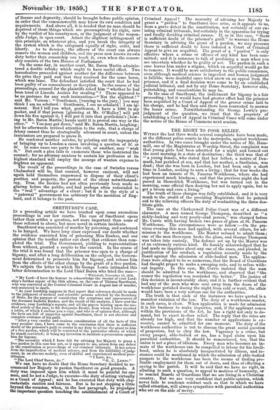THE RIGHT TO POOR. RELIEF.
WITHIN the last three weeks several complaints have been made, at the different police courts in the metropolis, against workhouse authorities. In two cases brought under the notice of Mr. Hare- mill, one of the Magistrates at Worship Street, the complaint was that young girls had been admitted for a night and turned out the next morning in a state of destitution ; the third was that of "a young female, who stated that her father, a native of Den- mark, had perished at sea, and that her mother, a Sardinian, was dead ; that she was born in London, but had been only a short time in London, seeking to earn a living; that for four weeks she had been an inmate of St. Pancras Workhouse, where she had experienced much kindness ; and that the previous night she had passed in Shoreditch Workhouse, but was turned out in the morning, some official then desiring her not to apply again, but to get a broom and earn a living." The truth of these charges was fully established, and it is very much to the credit of the presiding Magistrate that he pointed out to the relieving officers the duty of readmitting the three des- titute girls. The case at the Clerkenwell Police Court was of a different
character. A man named George Thompson, described as "a sickly-looking and very poorly-clad person," was charged before Mr. Corrie with having broken two panes of glass at St. Pancras Workhouse. The circumstances were as follow :—On the pre- vious evening this man had applied, with several others, for ad- mission to the workhouse. lhe Master refused. to admit them; one of the men thereupon broke the glass, and George Thompson was taken into custody. The defence set up by the Master was of an extremely curious kind. He frankly acknowledged that he had made no inquiries about any one of the cases, and pleaded, in justification of his conduct, a regulation recently made by the Board against the admission of able-bodied men. The applica- tions were alleged to be so numerous, that the Board of Guardians had thought proper to make a sweeping rule, and to refuse with- out inquiry. In this case, Mr. Corrie insisted that the man should be admitted to the workhouse, and observed that "the sooner the regulation was reminded the better." The justice of this decision is incontestably clear, and it is further evident that had any of the men who were sent away from the doors of the workhouse perished during the night from cold or want, the affair would have been a very serious one for the authorities.
The truth is that each of the instances we have quoted is a
manifest violation of the law. The duty of a workhouse master, in such cases, is clear. When application is made for admission it is his business to make inquiries, and, if the applicant comes within the provisions of the Act, he has a right not only to de- mond, but to exact in-door relief. The reply that the rates are already too high, and that the number of -applications is ex- cessive, cannot be admitted for one moment. The duty of the workhouse authorities is not to discuss the great social question of pauperism, but to obey the law. Vagrancy is a crime, but every pauper, able-bodied or no, has a legal claim upon his parochial authorities. It should be remembered, too, that the union is not a place of idleness. Every man who becomes an in- mate of the workhouse can be compelled to labour for his liveli- hood, unless he is absolutely incapacitated by illness, and in- stances could be mentioned in which the admission of able-bodied paupers to the workhouse has been the means of finding pro- fitable employment for them out of doors, and thus of effecting a saving to the parish. It will be said that we have no right, in alluding to such a question, to appeal to motives of humanity, or to remind Boards of Guardians that we are living in a Christian country. But we are very confident that public opinion, which never fails to condemn conduct such as that to whisk we have called attention, will always sympathize with parochial authorities who err on the side of mercy.


























 Previous page
Previous page